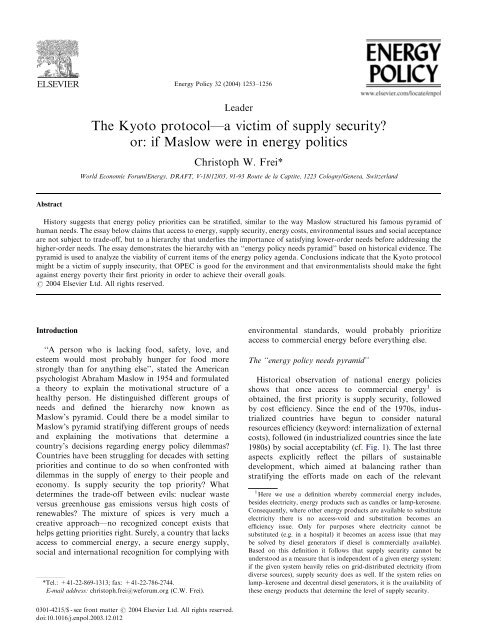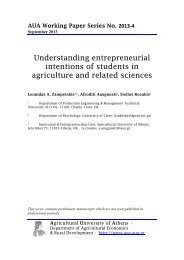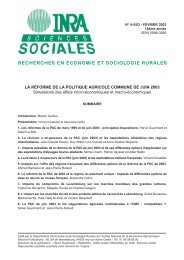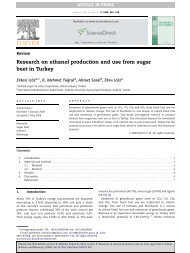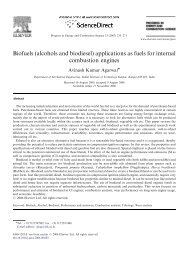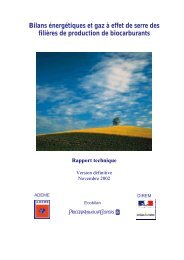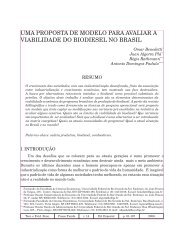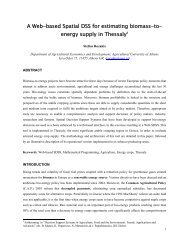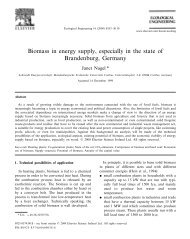The Kyoto protocol—a victim of supply security? or: if Maslow were ...
The Kyoto protocol—a victim of supply security? or: if Maslow were ...
The Kyoto protocol—a victim of supply security? or: if Maslow were ...
You also want an ePaper? Increase the reach of your titles
YUMPU automatically turns print PDFs into web optimized ePapers that Google loves.
ARTICLE IN PRESSEnergy Policy 32 (2004) 1253–1256Leader<strong>The</strong> <strong>Kyoto</strong> <strong>protocol—a</strong> <strong>victim</strong><strong>of</strong> <strong>supply</strong> <strong>security</strong>?<strong>or</strong>: <strong>if</strong> <strong>Maslow</strong> <strong>were</strong> in energy politicsChristoph W. Frei*W<strong>or</strong>ld Economic F<strong>or</strong>um/Energy, DRAFT, V-18/12/03, 91-93 Route de la Captite, 1223 Cologny/Geneva, SwitzerlandAbstractHist<strong>or</strong>y suggests that energy policy pri<strong>or</strong>ities can be strat<strong>if</strong>ied, similar to the way <strong>Maslow</strong> structured his famous pyramid <strong>of</strong>human needs. <strong>The</strong> essay below claims that access to energy, <strong>supply</strong> <strong>security</strong>, energy costs, environmental issues and social acceptanceare not subject to trade-<strong>of</strong>f, but to a hierarchy that underlies the imp<strong>or</strong>tance <strong>of</strong> satisfying lower-<strong>or</strong>der needs bef<strong>or</strong>e addressing thehigher-<strong>or</strong>der needs. <strong>The</strong> essay demonstrates the hierarchy with an ‘‘energy policy needs pyramid’’ based on hist<strong>or</strong>ical evidence. <strong>The</strong>pyramid is used to analyze the viability <strong>of</strong> current items <strong>of</strong> the energy policy agenda. Conclusions indicate that the <strong>Kyoto</strong> protocolmight be a <strong>victim</strong> <strong>of</strong> <strong>supply</strong> in<strong>security</strong>, that OPEC is good f<strong>or</strong> the environment and that environmentalists should make the fightagainst energy poverty their first pri<strong>or</strong>ity in <strong>or</strong>der to achieve their overall goals.r 2004 Elsevier Ltd. All rights reserved.Introduction‘‘A person who is lacking food, safety, love, andesteem would most probably hunger f<strong>or</strong> food m<strong>or</strong>estrongly than f<strong>or</strong> anything else’’, stated the Americanpsychologist Abraham<strong>Maslow</strong> in 1954 and f<strong>or</strong>mulateda the<strong>or</strong>y to explain the motivational structure <strong>of</strong> ahealthy person. He distinguished d<strong>if</strong>ferent groups <strong>of</strong>needs and defined the hierarchy now known as<strong>Maslow</strong>’s pyramid. Could there be a model similar to<strong>Maslow</strong>’s pyramid strat<strong>if</strong>ying d<strong>if</strong>ferent groups <strong>of</strong> needsand explaining the motivations that determine acountry’s decisions regarding energy policy dilemmas?Countries have been struggling f<strong>or</strong> decades with settingpri<strong>or</strong>ities and continue to do so when confronted withdilemmas in the <strong>supply</strong> <strong>of</strong> energy to their people andeconomy. Is <strong>supply</strong> <strong>security</strong> the top pri<strong>or</strong>ity? Whatdetermines the trade-<strong>of</strong>f between evils: nuclear wasteversus greenhouse gas emissions versus high costs <strong>of</strong>renewables? <strong>The</strong> mixture <strong>of</strong> spices is very much acreative approach—no recognized concept exists thathelps getting pri<strong>or</strong>ities right. Surely, a country that lacksaccess to commercial energy, a secure energy <strong>supply</strong>,social and international recognition f<strong>or</strong> complying with*Tel.: +41-22-869-1313; fax: +41-22-786-2744.E-mail address: christoph.frei@wef<strong>or</strong>um.<strong>or</strong>g (C.W. Frei).environmental standards, would probably pri<strong>or</strong>itizeaccess to commercial energy bef<strong>or</strong>e everything else.<strong>The</strong> ‘‘energy policy needs pyramid’’Hist<strong>or</strong>ical observation <strong>of</strong> national energy policiesshows that once access to commercial energy 1 isobtained, the first pri<strong>or</strong>ity is <strong>supply</strong> <strong>security</strong>, followedby cost efficiency. Since the end <strong>of</strong> the 1970s, industrializedcountries have begun to consider naturalresources efficiency (keyw<strong>or</strong>d: internalization <strong>of</strong> externalcosts), followed (in industrialized countries since the late1980s) by social acceptability (cf. Fig. 1). <strong>The</strong> last threeaspects explicitly reflect the pillars <strong>of</strong> sustainabledevelopment, which aimed at balancing rather thanstrat<strong>if</strong>ying the eff<strong>or</strong>ts made on each <strong>of</strong> the relevant1 Here we use a definition whereby commercial energy includes,besides electricity, energy products such as candles <strong>or</strong> lamp-kerosene.Consequently, where other energy products are available to substituteelectricity there is no access-void and substitution becomes anefficiency issue. Only f<strong>or</strong> purposes where electricity cannot besubstituted (e.g. in a hospital) it becomes an access issue (that maybe solved by diesel generat<strong>or</strong>s <strong>if</strong> diesel is commercially available).Based on this definition it follows that <strong>supply</strong> <strong>security</strong> cannot beunderstood as a measure that is independent <strong>of</strong> a given energy system:<strong>if</strong> the given systemheavily relies on grid-distributed electricity (fromdiverse sources), <strong>supply</strong> <strong>security</strong> does as well. If the systemrelies onlamp–kerosene and decentral diesel generat<strong>or</strong>s, it is the availability <strong>of</strong>these energy products that determine the level <strong>of</strong> <strong>supply</strong> <strong>security</strong>.0301-4215/$ - see front matter r 2004 Elsevier Ltd. All rights reserved.doi:10.1016/j.enpol.2003.12.012
1254ARTICLE IN PRESSC.W. Frei / Energy Policy 32 (2004) 1253–1256deficit needs satisfiersno debatepossibledebatepossiblesocialacceptabilitynatural resourcesefficiencycost efficiency<strong>security</strong><strong>of</strong> <strong>supply</strong>access tocommercial energyFig. 1. Energy policy needs pyramid.aspects. To what extent does political viability leaveroomf<strong>or</strong> trade-<strong>of</strong>fs <strong>or</strong> f<strong>or</strong> balancing needs?In <strong>Maslow</strong>’s pyramid, the hierarchy illustrates thatonly once the lower-<strong>or</strong>der needs <strong>of</strong> physical andemotional well-being are satisfied, do we concernourselves with the higher-<strong>or</strong>der needs <strong>of</strong> influence andpersonal development. Conversely, <strong>if</strong> the aspects thatsatisfy our lower-<strong>or</strong>der needs disappear, we are nolonger concerned about the maintenance <strong>of</strong> our higher<strong>or</strong>derneeds. Can we observe similar patterns inhist<strong>or</strong>ically observed energy policy pri<strong>or</strong>ities?It seems obvious that the question <strong>of</strong> <strong>supply</strong> <strong>security</strong>only matters to people who already have access tocommercial energy. Regarding the next higher level, itcan be observed that the question <strong>of</strong> <strong>supply</strong> <strong>security</strong>prevails over cost-efficiency, environmental and socialissues. <strong>The</strong> US provides respective evidence, given thatover the past years concerns about decreasing <strong>supply</strong><strong>security</strong> have won out (not only) over environmentalissues such as climate change and Alaskan wildernesspreservation. Further, the increasing questioning <strong>of</strong>electricity market liberalization—with its promise <strong>of</strong>cost efficiency in energy <strong>supply</strong>—following the 2003summer <strong>of</strong> blackouts, again indicates that <strong>supply</strong><strong>security</strong> takes precedence over the low-cost energy issue.A similar conclusion can be derived from the observationthat China has set up f<strong>or</strong> its automotive industrystringent and cost-intensive constraints regarding theper mileage consumption (as <strong>of</strong> 2005). <strong>The</strong> driver behindthis is energy <strong>security</strong> (m<strong>or</strong>e than environmental)concerns in the context <strong>of</strong> a rapidly growing mobilitymarket and a just as rapidly growing f<strong>or</strong>eign energy (oil)dependency. Again, <strong>supply</strong> <strong>security</strong> ranks over (here:mobility) costs. A number <strong>of</strong> economists promoteinternalization <strong>of</strong> external costs, i.e. the application <strong>of</strong>the polluter-pays principle, adopting the viewpoint thatthis would be economically efficient, while othereconomists promote market liberalization f<strong>or</strong> preciselythe same reason. Reality shows that only the latter is onmost national policy agendas what suggests that lowcostissues prevail over economically just<strong>if</strong>iable environmentalconcerns. Likewise, President Putin illustratesthis point when he states that the domestic fight againstpoverty is m<strong>or</strong>e urgent than the rat<strong>if</strong>ication <strong>of</strong> the <strong>Kyoto</strong>protocol (while at the same time liberalizing theelectricity industry). Finally, the nuclear waste problem<strong>or</strong> the esthetics <strong>of</strong> wind farms is debated only inindustrialized countries where the lower-<strong>or</strong>der needsare satisfied. Social acceptance and environmentalissues are <strong>of</strong>ten closely related what indicates thatthe hierarchy among the top two issues is not verystrong.Besides confirming the hist<strong>or</strong>ically grown ‘‘energypolicy needs hierarchy’’, the previous examples suggestthat balancing pri<strong>or</strong>ities may be politically feasible onlyto a limited extent, and only among the higher-<strong>or</strong>derneeds.One could argue that Italy is an exception to theabove-outlined rule—a country where the factualabandon <strong>of</strong> nuclear energy in 1987 without an appropriatereplacement has lead to a situation where the<strong>security</strong> <strong>of</strong> today’s electricity <strong>supply</strong> is questioned as the2003 blackout has confirmed. Still, the decision <strong>of</strong>stopping nuclear energy may have been taken by thedeciders (the people) without the full awareness andunderstanding <strong>of</strong> the problem<strong>of</strong> <strong>supply</strong> <strong>security</strong> and itsconsequences. It will be interesting to observe whatItalians will do in reaction to the recent blackout.This simple model can describe the motivationalstructure determining a nation’s policy that is concernedwith <strong>supply</strong>ing energy to its economy and people. <strong>The</strong>pyramid is based on observations and is theref<strong>or</strong>e <strong>of</strong> apurely descriptive nature and it would be wrong tointerpret it as a n<strong>or</strong>mative hierarchy. In other w<strong>or</strong>ds, thestatement that e.g. <strong>supply</strong> <strong>security</strong> issues would prevailover ecological concerns is purely based on observation—byno means does the hierarchy m<strong>or</strong>ally just<strong>if</strong>ythis hierarchy. Further, by drawing a simple picture, wedid not consider the nexus with other policy domains—constraints frombudget policy, fiscal policy, healthpolicy, etc., which can have an imp<strong>or</strong>tant impact onenergy policy, both on a national and internationallevel. As an example, decisions related to ‘‘<strong>security</strong> <strong>of</strong>demand’’ in oil and gas exp<strong>or</strong>ting countries are drivenby budget policy and are not necessarily part <strong>of</strong> thenation’s policy that is concerned with <strong>supply</strong>ing energyto its economy and people—but they clearly affectenergy geopolitics and thereby the <strong>supply</strong> <strong>security</strong> <strong>of</strong>other countries.That said, the pyramid reflects a certain reality. Bylearning fromit we might avoid chasing illusions—desirable as they might be. Like a pianist, dreaming <strong>of</strong>Rachmaninov’s third piano concerto—choosing to playone <strong>of</strong> his preludes instead, being realistic about thelimits <strong>of</strong> his technique and finger ability, does not keephimfromdreaming and slowly getting closer to hisdreambut prevents himfrombeing frustrated fromhaving spent his talent and time on a failed attempt thataimed a level too high.
ARTICLE IN PRESSC.W. Frei / Energy Policy 32 (2004) 1253–1256 1255So, let us now extrapolate and behave as <strong>if</strong> thepyramid was to determine future energy policy pri<strong>or</strong>ities.Using the pyramid as a crystal ballFirst <strong>of</strong> all, the pyramid tells us that a good publicunderstanding <strong>of</strong> the <strong>supply</strong> <strong>security</strong> issue is crucial. Weshould bear in mind that <strong>security</strong> perception is based notonly on facts but is, to a certain extent, a socialphenomenon making the public understanding imp<strong>or</strong>tant.As long as no clear understanding and agreementon appropriate level <strong>of</strong> <strong>supply</strong> <strong>security</strong> exists, lobbieswho may be questioned by higher-<strong>or</strong>der needs will usethe ‘‘fear-tactic’’. In other w<strong>or</strong>ds, they will insist that theexisting level <strong>of</strong> <strong>supply</strong> <strong>security</strong> is inadequate therebysharpening the focus on pure <strong>supply</strong>/demand issues,away fromhigher-<strong>or</strong>der needs. Thus good publicunderstanding <strong>of</strong> an appropriate level <strong>of</strong> <strong>supply</strong> <strong>security</strong>should be (at least f<strong>or</strong> industrialized countries) thefoundation on which energy policy is built.<strong>The</strong> <strong>Kyoto</strong> <strong>protocol—a</strong> <strong>victim</strong> <strong>of</strong> <strong>supply</strong> <strong>security</strong>? Aslong as <strong>supply</strong> <strong>security</strong> is a dominant issue on theinternational energy policy scene, the attempt to reachinternational agreements regarding higher-<strong>or</strong>der needs isseriously questioned. It may theref<strong>or</strong>e be wrong to waitf<strong>or</strong> the <strong>Kyoto</strong> protocol to be rat<strong>if</strong>ied without startingparallel actions. Building ‘‘coalitions <strong>of</strong> the willing’’ t<strong>of</strong>ight climate change—coalitions among those who canaff<strong>or</strong>d it, be it among industry leaders, among countriesthat are comf<strong>or</strong>table with their level <strong>of</strong> <strong>supply</strong> <strong>security</strong>,across consumers who can aff<strong>or</strong>d it, etc.—may be m<strong>or</strong>eeffective in the sh<strong>or</strong>t term.‘‘Po<strong>or</strong> people desperately want energy, electricityparticularly’’, acc<strong>or</strong>ding to Barbara Stocking, ExecutiveDirect<strong>or</strong>, OxfamGB. Today, around 1.6 billion people,<strong>or</strong> one-quarter <strong>of</strong> the w<strong>or</strong>ld’s population do not haveaccess to electricity. This energy divide has many faces.<strong>The</strong> standard <strong>of</strong> living improves with access tocommercial energy; electricity makes it possible to coolmedical drugs <strong>or</strong> to pump water. Acc<strong>or</strong>ding to theW<strong>or</strong>ld Energy Investment Outlook published in 2003 bythe International Energy Agency the cost <strong>of</strong> providingelectricity access by 2030 to the then estimated 1.4billion people without access is estimated at US$ 665billion (compared to US$ 9841 billion needed overallelectricity investments on a w<strong>or</strong>ldwide level over thesame time period). Acc<strong>or</strong>ding to the same source, totalCO 2 emissions would increase by as little as 1.4–1.6%.Would you ask your co-citizen who has not enough tosecure a meal and a bed to spend his time and money f<strong>or</strong>fire brigade contributions? No doubt, there may be a fireand there is a common interest in having a fire brigade.Is your conclusion that society should pay f<strong>or</strong> such aservice while the w<strong>or</strong>se-<strong>of</strong>f should be exempted from anypayment? What about the case where the potential fire iscalled climate change and co-citizens are co-nations,some <strong>of</strong> which with a maj<strong>or</strong>ity <strong>of</strong> the people still withoutaccess to commercial energy? We may consider that onlycountries that have secured a certain level <strong>of</strong> electricityat a reasonable cost would be willing to commit(intrinsically motivated) to an environmental agenda.F<strong>or</strong> the opposite case, <strong>if</strong> coal is locally available andcheap, that is what will be used—full stop. IndiraGandhi captured this situation eloquently, referring topoverty as the ultimate pollutant (Stockholm, 1972).<strong>The</strong> pyramid would suggest that fighting energy povertyshould rank top on the w<strong>or</strong>ld’s energy agenda bef<strong>or</strong>einternational agreements on higher-<strong>or</strong>der energy needscan be achieved. Should this make the fight againstenergy poverty an environmentalist’s first pri<strong>or</strong>ity?Is OPEC good f<strong>or</strong> the environment? We all know therationale that OPEC helps preserving scarce resourcesby maintaining high prices—here we follow anothertrack to find a similar conclusion. We could observe thatOPEC has, during the Venezuela crisis in early 2003 andthe war in Iraq in 2003, contributed to maintain <strong>supply</strong>and demand balanced at a surprisingly stable price—OPEC has thereby acted as an imp<strong>or</strong>tant contribut<strong>or</strong> toenergy–geopolitical <strong>supply</strong> <strong>security</strong>. Would it have beena cartel-free market, we might have seen much higherprice spikes. This again made and makes it possible f<strong>or</strong>individual countries to continue to address higher-<strong>or</strong>derneeds. Doesn’t this make OPEC a facilitat<strong>or</strong> <strong>of</strong> potentialenvironmental policy measures in the countries thatbenefit fromthe improved <strong>supply</strong> <strong>security</strong> (at least aslong as long-terminvestments are ensured even thoughthe lack <strong>of</strong> clear price signals may keep markets from anappropriate anticipation)? If we carry the same rationalea bit further, would a sh<strong>if</strong>t to a cartel-free, gas prevailedenergy picture question today’s level <strong>of</strong> environmentalpolicy?What <strong>if</strong> we go from cheap to expensive energy? This isevery environmentalist’s hope, as such a scenario islikely to increase eff<strong>or</strong>ts towards energy efficiencies andsavings. It is, theref<strong>or</strong>e, also likely to go along withcapital-intensive high-tech solutions. Social acceptancewould probably lose weight in the policy agenda,helping controversial technologies such as nuclearpower to find their way back in the energy mix. Further,the high capital cost <strong>of</strong> advanced technologies would belikely to increase the divide between the energy-po<strong>or</strong> andthe energy-rich countries, making the bridging <strong>of</strong> theenergy divide an even m<strong>or</strong>e imp<strong>or</strong>tant issue.Does the pyramid advocate f<strong>or</strong> the hydrogen economy?<strong>The</strong> vision <strong>of</strong> hydrogen as a st<strong>or</strong>able and mobilesecondary energy carrier complementing electricity asthe stationary counterpart is considered to lay far in thefuture—is it 30 years, 50 years? If hydrogen (<strong>or</strong> anothersecondary energy carrier) can be produced, st<strong>or</strong>ed andtransp<strong>or</strong>ted in large quantities fromw<strong>or</strong>ldwide welldistributedresources (be it coal, nuclear, <strong>or</strong> renewable
1256ARTICLE IN PRESSC.W. Frei / Energy Policy 32 (2004) 1253–1256energy) the energy–geopolitical risk could be sign<strong>if</strong>icantlyreduced compared to today. Today’s known oiland natural gas reserves are geographically very muchconcentrated to a few (to a large extent considered‘‘unstable’’) regions. Even <strong>if</strong> expensive, the potential <strong>of</strong>increasing <strong>supply</strong> <strong>security</strong> could, as we are told by ourpyramid, be an accelerating advocate f<strong>or</strong> this vision.Like many the<strong>or</strong>ies, <strong>Maslow</strong>’s hasn’t endured the test<strong>of</strong> time—it failed to explain the existence <strong>of</strong> poets. Poetswould probably not exist <strong>if</strong> their first preoccupation waslower <strong>or</strong>der needs such as the health <strong>of</strong> their bankbalances. Yet, poets are a min<strong>or</strong>ity. <strong>The</strong>y are just asmuch <strong>of</strong> a min<strong>or</strong>ity as countries that give equal pri<strong>or</strong>ityto environmental concerns and <strong>supply</strong> <strong>security</strong> issues.We may challenge our pri<strong>or</strong>ities (and the pyramids) withnew visions; and then, perhaps, there will be m<strong>or</strong>e poets.We may however decide to focus on visionary projectsaligned with how today’s w<strong>or</strong>ld functions; and then,hopefully, there will be less energy poverty.One may expect that similar reflections can st<strong>or</strong>mthe brain in the context <strong>of</strong> other economic fact<strong>or</strong>sincluding lab<strong>or</strong>, capital, inf<strong>or</strong>mation <strong>or</strong> resources suchas water.I owe gratitude f<strong>or</strong> critical comments to Laura Cozzi,Gerald Doucet, Stuart Brooks, Ged Davis, JeremyJurgens and Andy Richards. <strong>The</strong> ideas and opinionsexpressed are those <strong>of</strong> the auth<strong>or</strong> who is solelyresponsible f<strong>or</strong> mistakes and omissions.


